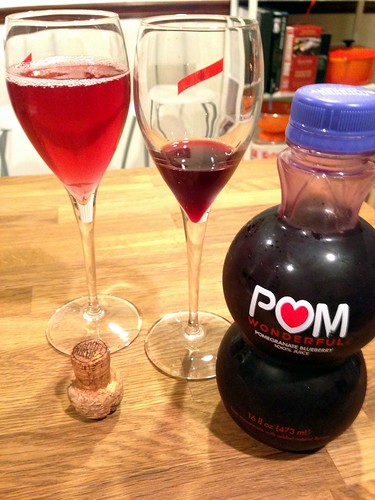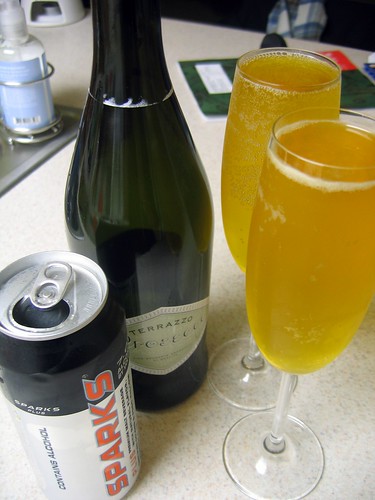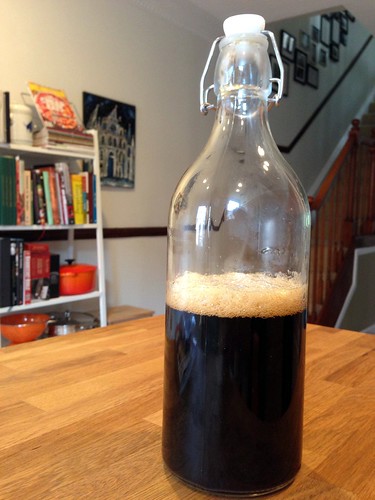Well hello there. I just thought I'd pop by for a sec and see how y'all are doing. More than one of you has asked the question so I thought maybe it's time I drop by to answer that question, and by "that question" I mean, "What the hell happened here?"

To be blunt, I almost died. The day after my last post I was hospitalized with a pulmonary embolism. Several, actually; both of my lungs were completely riddled with clots, and that pretty much changed everything. I was put on medication that severely limited my diet (no alcohol, no greens, no fats, NO ALCOHOL), and as you might guess, a severely limited diet severely limits the recipes one might want to share on one's recipe blog.
Luckily(?) that medication didn't work, and at the end of the summer I almost died AGAIN. And of course I did, because I'm the girl who had chicken pox TWICE as a child. So I switched over to this new experimental drug that has no diet restrictions (YAY ALCOHOL), but as I told Vahid last weekend, that does nothing to alleviate the shitty lighting situation I've got going on in my kitchen. Until I figure out a solution to that problem, all of those half-written recipes I have waiting in the wings will just have to wait some more (wings, incidentally, being one of those waiting recipes).

I thought that while I'm checking in I might as well talk to you about how I learned to cook in the first place, you know, in case that maybe helps you learn how to cook or get more comfortable in the kitchen or whatever it is you hope to accomplish by reading this nonsense. I don't know your life. But I do know mine, and yes, it all started in my mother's kitchen.
As many of you know, my mother is an amazing cook. But she comes from "the old country," and from what I've gathered over the years, people from "the old country" see their children mainly as sources of manual labor. So while I started helping my mother cook at an obscenely early age (I was rolling chả giò before I could talk), I was basically doing all the hard work. Like rolling chả giò. Crushing cornflakes and peanuts. Peeling potatoes. Prepping green beans. You know, all the SEXY GLAMOROUS STUFF.
While I did pick up a few things from my mom, and from all the crazy group meals my friends and I shared in college, it wasn't until I got to law school that I bought my first cookbook. And that cookbook is
this cookbook.

I wanted to learn how to cook everything, so I bought a book on how to cook everything. And to this day, it's still the first place I turn to when I want to try something new. The instructions are clear, the recipes are simple, and most of all, they are bare-bones BASIC. In other words, they're the perfect jumping off point for experimentation. My copy of
How To Cook Everything is filled with scribbles: ingredients to add, extra steps to up the ante, notes on what worked really well. If you don't have a copy, run out and get one immediately.
When I first moved to DC I didn't have cable, so I ended up watching a whole lot of PBS. (The other day my boyfriend said he'd fight to the death anyone who dared suggest that I wasn't the very first American to watch
Downton Abbey. I still watch a lot of PBS apparently.) And while I was watching a lot of PBS, I watched a lot of
America's Test Kitchen. Hoo boy, this show. If you want very specific instructions on how to do things, this is the show for you. Their recipes are INSANELY FUSSY; like, they are the polar opposite of Bittman's. But they are really, really great at actually teaching you how to cook. They not only show you how to dice an onion, they explain why it's important that your onion is diced evenly. They get to the science of cooking, and when you understand that, cooking is easy peasy.

It wasn't until I moved in with Mitch and Seth that I got cable, and started watching
Good Eats. That thing I said about ATK and the science of cooking? Consider this a graduate course.

So there you have it. I learned how to cook from a book and two television shows. Looking back it turns out this was an incredibly boring story, so if you made it this far, I apologize for putting you to sleep. Maybe I'll bake you a cake or something.












